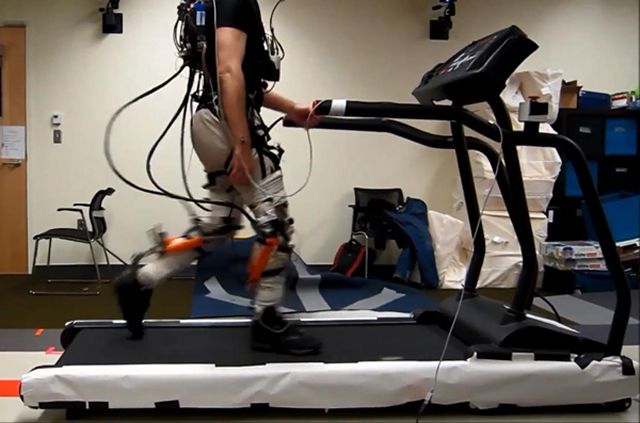Breaking news
New Wearable Exosuit Project for US Soldiers supported by DARPA.
| a | |||
Defence & Security News - United States |
|||
| Monday, September 15, 2014 01:41 PM | |||
| New Wearable Exosuit Project for US Soldiers supported by DARPA | |||
US
Soldiers in the future could be equipped with "Soft Exosuits"
under their combat gear, making it easier to walk long distances and carry
heavy loads, thanks to robotic research going on at Harvard University
and grant money from the US Defense Advanced Research Projects Agency
(DARPA).
|
|||
 The Soft Exosuits will be evaluated at the US Army Research Laboratory later this month |
|||
A team at the Wyss Institute for Biologically Inspired Engineering at Harvard created the Soft Exosuits, which mimic the actions of body joints when a person walks while wearing the suit. It also provides "small but carefully time assistance" at leg joints, enhancing wearer mobility. The Soft Exosuit - part of DARPA's Warrior Web program aimed to reduce military injuries - features a light and flexible body and is designed to be slipped on like a pair of pants. DARPA will award the Wyss Institute with up to $2.9 million for their research, a grant contingent on meeting certain technical milestones, the Harvard Gazette reported. So far, the smart suit can adapt to movement with the help of unique textiles and advanced technologies. "Certain components of the suit align with muscles and tendons, such as the hip and ankles, and microprocessors and sensors detect what a person is trying to do," told Wyss Institute Core Faculty member Conor Walsh. "Soft wearable robotics is a fundamentally new technology," Walsh, also an assistant Professor of Mechanical and Biomedical Engineering at Harvard and founder of the Harvard Biodesign Lab, said. "Traditional robotic technology is focused on industrial apps, but we are taking a fresh look at [wearable] technology for people." The suit features a "low-power microprocessor and a network of supple strain sensors" that monitor various motions, including running and walking, the Wyss Institute reports. Existing wearable robots are more rigid and can restrict mobility, but Soft Exosuits feature light and flexible power seams that won't impede mission operations. Moreover, the system can reduce the risk of fatigue and injuries of soldiers carrying heavy loads. "Over just a couple of short years, Conor and his team will work to fundamentally shift the paradigm of what is possible in wearable robotics," said Wyss Institute Founding Director Don Ingber, M.D., Ph.D. in a statement. "Their work is a great example of the power of bringing together people from multiple disciplines with focused resources to translate what first seems like a dream into a product that could transform people's lives." Dr. Walsh and his team are hopeful that their Soft Exosuits will also eventually aid impaired people. Stroke patients, for example, often have limited mobility in one leg, but with more research and clinical collaboration, the suit could help restore the movement and symmetry of impaired limbs to match healthy ones. The Soft Exosuits will be evaluated at the US Army Research Laboratory later this month. |
|||



















